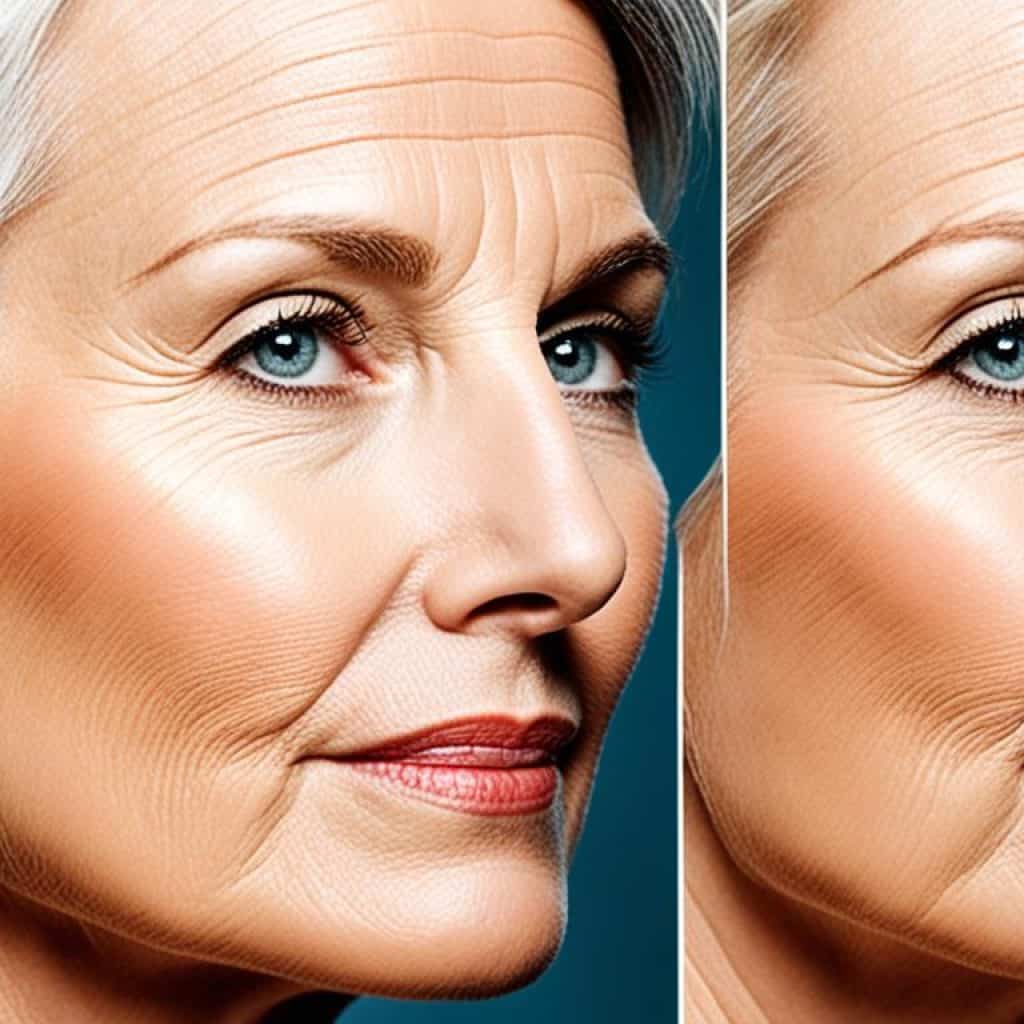Turning 50 is a significant milestone in your life. It’s a time of reflection, celebration, and embracing the wisdom and experiences that have shaped you. As you enter this new phase, it’s essential to prioritize your health and well-being, allowing yourself to live your best life at 50.
At 50, it’s normal to experience various changes, both physical and emotional. But don’t be discouraged! This is an opportunity to embrace the journey and make conscious choices that will positively impact your future. In this article, we will explore the effects of aging on different aspects of your life and provide valuable tips on how to maintain good health and happiness as you navigate this new chapter.
Key Takeaways:
- Turning 50 is a significant milestone that should be celebrated and embraced.
- Prioritize your health and well-being to live your best life at 50.
- Understand the changes that come with age and make conscious choices to adapt to them.
- Explore the effects of aging on different aspects of your life, including cognitive function, emotional well-being, and physical health.
- Implement lifestyle changes, such as a healthy diet, regular exercise, and routine health screenings, to ensure a fulfilling and happy life at 50 and beyond.
Cognitive Function and Mental Health
As you enter your 50s, maintaining cognitive function and mental health becomes increasingly important. While cognitive decline may be a concern, it’s essential to remember that cognitive function tends to remain relatively stable during this phase of life. In fact, negative beliefs about cognitive decline can have a detrimental impact on brain function.
There are several ways to support your brain health and promote mental well-being. One effective strategy is following a Mediterranean diet, which has been associated with improved brain function. This diet emphasizes consuming a variety of nutrient-rich foods such as fruits, vegetables, whole grains, and healthy fats.
Staying physically active is another key aspect of maintaining cognitive function. Engaging in regular exercise promotes blood flow to the brain and supports the growth of new brain cells. Additionally, physical activity has been linked to reduced risk of cognitive decline and improved overall mental health.
Mental exercises, such as puzzles, reading, and learning new skills, can also help stimulate brain function and enhance cognitive abilities. These activities challenge the brain and promote neural connections.
“Incorporating a Mediterranean diet, regular physical activity, and mental exercises into your lifestyle can contribute to maintaining cognitive function and promoting positive mental health.”
By adopting a holistic approach that includes a nutritious diet, regular exercise, and mental stimulation, you can support your brain health and mental well-being throughout your 50s and beyond.
Benefits of a Mediterranean Diet:
- Rich in fruits and vegetables that provide essential vitamins and antioxidants
- Includes whole grains that contribute to a healthy digestive system
- Incorporates healthy fats from sources such as olive oil and nuts, which are beneficial for brain health
Mental Exercises:
- Engaging in puzzles, crosswords, and brain-training apps
- Reading books, articles, or engaging in challenging discussions
- Learning new skills or pursuing hobbies that require mental effort
Emotional Well-being
Reaching the age of 50 is often accompanied by a sense of satisfaction with life, as the majority of individuals in this age group report being content and fulfilled. However, for women, this stage of life can also bring about hormonal shifts due to menopause, which may lead to mood changes and emotional fluctuations.
While these changes can be challenging, there are proactive steps you can take to support your emotional well-being. One effective approach is to incorporate physical activity into your daily routine. Engaging in regular exercise not only has numerous physical health benefits but also has a positive impact on mental well-being, helping to alleviate stress, reduce anxiety, and improve mood.
By reducing sedentary behavior and embracing physical activity, you can experience an overall uplift in your emotional state. Even simple activities such as walking, swimming, or practicing yoga can make a significant difference in boosting your mood and promoting a sense of well-being.
The Power of Physical Activity
Research has shown that engaging in physical activity stimulates the release of endorphins, also known as “feel-good” hormones, in the brain. These natural chemicals contribute to an increased sense of happiness and satisfaction, allowing you to navigate through the menopausal phase with greater ease.
Additionally, physical activity offers an opportunity to socialize and connect with others, leading to improved social well-being and an increased sense of belonging. Joining a group fitness class, participating in a walking group, or even exercising with a friend can provide valuable social support and uplift your spirits during this transitional phase.
Remember that it’s important to choose physical activities that you enjoy and that are suitable for your current fitness level. Listen to your body, pace yourself, and gradually increase the intensity and duration of your workouts to avoid injury.
Engaging in regular physical activity not only benefits your emotional well-being but also supports your overall health and vitality. By embracing an active lifestyle, you can navigate through menopause with resilience, maintaining a positive outlook and embracing all that this phase of life has to offer.
Immune System
As we age, our immune system undergoes natural changes that can make individuals aged 50 and above more vulnerable to infections. It becomes crucial to prioritize the health of our immune system to stay protected against diseases. One effective way to safeguard our immune system is by staying up to date on vaccinations.
Vaccines play a critical role in preventing infections and keeping our immune system strong. By receiving recommended vaccines, we can protect ourselves from illnesses such as flu, pneumonia, and tetanus.
Flu vaccines, for example, are designed to help our bodies develop immunity against the seasonal influenza virus. They are especially important for older adults who have a higher risk of complications from the flu. Pneumonia vaccines can provide protection against bacterial infections of the lungs, which can be severe for individuals with weakened immune systems. Tetanus vaccines, on the other hand, help prevent a serious bacterial infection that can cause muscle stiffness and lockjaw.
By taking the necessary steps to ensure our vaccinations are current, we can lower the risk of infections and maintain a healthy immune system well into our 50s and beyond.

Hearing
Approximately 40% of individuals over the age of 50 experience some degree of hearing loss. As we age, our hearing abilities can be affected by various factors, including age-related changes, genetic factors, and underlying health conditions.
Hearing loss can have a significant impact on our quality of life, affecting our ability to communicate, participate in social activities, and even enjoy the sounds of the world around us. Therefore, it is important to understand the potential causes of age-related hearing loss and take proactive measures to safeguard our hearing health.
Genetic factors play a role in age-related hearing loss. Research has shown that certain gene variations can increase the risk of developing hearing loss as we get older. Additionally, underlying health conditions like high blood pressure and diabetes can contribute to the deterioration of our hearing abilities.
To track and address any potential hearing loss, regular hearing tests are essential. These tests can help identify any changes in our hearing abilities and allow for appropriate interventions to be implemented early on. Early detection and management of hearing loss can lead to improved communication, better quality of life, and overall well-being.
There are various interventions available for managing age-related hearing loss, including hearing aids, assistive listening devices, and auditory rehabilitation programs. Your audiologist or healthcare provider can guide you in choosing the most suitable option based on your specific needs and preferences.
Embracing regular hearing tests and taking proactive steps to maintain your hearing health can help you stay connected to the world of sound and enjoy a fulfilling life. Don’t let age-related hearing loss limit your ability to fully engage with others and appreciate the sounds that bring joy to your life.
Statistics on Hearing Loss
| Hearing Loss | Percentage of Individuals over Age 50 |
|---|---|
| Mild | 20% |
| Moderate | 15% |
| Severe | 5% |
Bone Health
As you reach your 50s, it’s important to prioritize the health and strength of your bones. This is because bone density naturally decreases with age, putting you at a higher risk for conditions like osteoporosis. Fortunately, there are steps you can take to support your bone health and reduce the risk of fractures.
One of the key factors in maintaining strong bones is getting enough calcium and vitamin D in your diet. Calcium is essential for bone strength, while vitamin D helps the body absorb and utilize calcium effectively. Good sources of calcium include dairy products, leafy greens, and fortified foods. Vitamin D can be obtained through sunlight exposure and foods like fatty fish, egg yolks, and fortified milk.
Exercise also plays a crucial role in maintaining bone health. Weight-bearing exercises, such as hiking, jogging, and dancing, help stimulate bone growth and increase bone density. Resistance exercises, such as strength training with weights or resistance bands, can further enhance bone strength. Incorporating a combination of these exercises into your routine can be highly beneficial for your bones.
In addition to diet and exercise, it’s important to avoid factors that can negatively impact bone health. These include smoking, excessive alcohol consumption, and a sedentary lifestyle. Smoking has been linked to decreased bone density, while excessive alcohol intake can interfere with calcium absorption. Leading a sedentary lifestyle can also contribute to bone loss, so it’s important to stay active and incorporate regular physical activity into your daily routine.
By taking steps to support your bone health, such as consuming calcium-rich foods, getting enough vitamin D, engaging in weight-bearing and resistance exercises, and avoiding harmful habits, you can help maintain strong bones and reduce the risk of osteoporosis and fractures as you age.
Muscle Strength and Physical Fitness
As you age past 50, it’s common to experience muscle loss and a decline in physical strength. However, there are steps you can take to preserve your muscle mass and improve your overall physical fitness.
Strength training exercises are particularly effective for combatting muscle loss. By incorporating activities like weightlifting or lunges into your routine, you can stimulate muscle growth and increase your physical strength. Aim for at least two to three sessions of strength training each week.
Balance exercises are also crucial to maintain stability and prevent falls, which can become more common as you age. Activities like yoga, tai chi, and single-leg stands can help improve your balance. Try to include these exercises in your fitness regimen at least two to three times per week.
In addition to strength training and balance exercises, it’s important to engage in cardiovascular activities to improve your overall fitness. Walking, swimming, or cycling are great forms of cardiovascular exercise that can boost your endurance and help maintain a healthy weight.
To get the most out of your fitness routine, consider seeking guidance from a qualified fitness professional who can design a program tailored to your needs and goals.
Remember, maintaining muscle strength and physical fitness is essential for enjoying an active and independent lifestyle as you age. Don’t let muscle loss hold you back â start incorporating strength training, balance exercises, and cardiovascular activities into your routine today!
Joint Health
Joints undergo wear and tear as you enter your 50s, which can lead to joint pain and an increased risk of arthritis. Taking proactive measures to maintain joint health becomes crucial during this stage of life. By adopting good posture, managing your weight, and staying hydrated, you can alleviate discomfort and promote long-term joint health.
Posture: Maintaining good posture is essential for reducing stress on your joints. When sitting or standing, ensure proper alignment of your spine, shoulders, and hips. Avoid slouching or hunching forward, as this can strain your joints.
Weight Management: Carrying excess weight places added pressure on your joints, particularly in weight-bearing areas like the knees and hips. By managing your weight through a balanced diet and regular exercise, you can reduce the strain on your joints and minimize discomfort.
Hydration: Staying hydrated is essential for joint health. It helps lubricate the joints, allowing them to move smoothly and preventing friction. Drink an adequate amount of water throughout the day to support joint function.
“Maintaining good posture, managing weight, and staying hydrated are key factors in promoting joint health and reducing the risk of joint pain and arthritis.”
Joint Health Tips:
- Avoid sitting or standing in the same position for prolonged periods, as this can increase joint stiffness.
- Engage in low-impact exercises that strengthen the muscles around your joints, such as swimming or cycling.
- Use caution when lifting heavy objects to prevent unnecessary strain on your joints.
- Wear supportive shoes that provide cushioning and shock absorption.
- Consider incorporating joint-specific supplements, such as glucosamine and chondroitin, into your daily routine after consulting with a healthcare professional.
Foods That Promote Joint Health
| Food | Nutrients |
|---|---|
| Fatty Fish (Salmon, Mackerel) | Omega-3 fatty acids, which have anti-inflammatory properties |
| Leafy Green Vegetables (Spinach, Kale) | Vitamins C and K, which support collagen production and bone health |
| Berries (Strawberries, Blueberries) | Antioxidants that help reduce inflammation and oxidative stress |
| Nuts and Seeds (Almonds, Flaxseeds) | Healthy fats and anti-inflammatory compounds |
| Yogurt | Calcium and vitamin D, which support bone health |
Heart Health
As you enter your 50s, it is important to pay close attention to your heart health. The risk of heart attacks increases with age, making it crucial to take proactive steps to protect your cardiovascular well-being.
Regular exercise plays a key role in maintaining a healthy heart. Engaging in physical activity not only helps to strengthen your heart muscle but also improves blood circulation, lowers cholesterol levels, and reduces the risk of developing heart disease.
| Heart-Healthy Exercise Ideas |
|---|
|
In addition to exercise, maintaining a healthy weight is essential for heart health. Excess weight puts strain on the heart and increases the risk of developing conditions such as high blood pressure, diabetes, and high cholesterol. By following a balanced diet and making conscious choices to consume nutrient-rich foods in appropriate portions, you can manage your weight and reduce the burden on your heart.
Controlling blood pressure is another crucial aspect of maintaining heart health. High blood pressure can damage the arteries and increase the risk of heart disease. Regular monitoring, lifestyle modifications, and working with your healthcare provider to develop a comprehensive plan can help you manage and control your blood pressure effectively.
“Taking care of your heart doesn’t mean you have to run a marathon or follow a strict diet. Small changes, such as incorporating regular physical activity, maintaining a healthy weight, and managing blood pressure, can go a long way in safeguarding your heart health.”
Finally, quitting smoking is one of the most impactful steps you can take to improve your heart health. Smoking damages the blood vessels, increases blood pressure, and significantly raises the risk of heart attacks. If you are a smoker, reaching out to support resources and developing a plan to quit can greatly reduce your heart attack risk.
By prioritizing regular exercise, maintaining a healthy weight, controlling blood pressure, and quitting smoking, you can significantly reduce the risk of heart attacks and promote overall heart health as you embrace your 50s.
Hair and Skin Changes
As you reach your 50s, it’s common to experience changes in your hair and skin. These changes are a natural part of the aging process and can include hair thinning and graying.
Hair thinning: Hair thinning is a common concern for both men and women. It is often caused by hormonal changes, genetics, and environmental factors. If you’re concerned about hair thinning, there are a few options you can consider. Hair dyes can help address the appearance of aging hair and provide a confidence boost.
Gray hair: Gray hair is also a natural part of aging. It occurs when the pigment cells in your hair follicles start to decrease. Embracing your gray hair can be empowering and a way to embrace your natural beauty. However, if you prefer to cover up your gray hair, there are many hair coloring products available that can help you achieve the desired look.
While addressing hair changes is important, it’s also essential to take care of your skin as you age. Sun damage can accelerate the aging process and contribute to wrinkles, age spots, and uneven skin tone. Protecting your skin from the sun’s harmful rays is crucial.
Sunscreen: Apply a broad-spectrum sunscreen with at least SPF 30 before going outdoors. Make sure to reapply it every two hours, especially if you’re spending extended periods in the sun.
Proper skincare: Establishing a skincare routine that includes cleansing, moisturizing, and exfoliating can help keep your skin healthy and vibrant. Look for products that are specifically designed for mature skin and address your specific concerns, such as hydration and fine lines.
Remember, embracing the changes that come with age is a wonderful way to celebrate and appreciate the journey of life. Take care of your hair and skin with love and confidence.

| Common Hair Changes | Common Skin Changes |
|---|---|
| Hair thinning | Wrinkles |
| Gray hair | Age spots |
Vision Changes
As you age, it’s common to experience vision changes that can affect your daily life. One such change is presbyopia, a condition that makes it difficult to focus on close objects.
To address this issue, many people find relief by using reading glasses. These glasses are designed to help you see clearly when reading or doing close-up work. By wearing reading glasses, you can improve your eyesight and comfortably perform tasks that require near vision.
However, it’s important to note that reading glasses are not a substitute for regular eye exams. Vision changes can occur due to various factors, including age-related eye conditions such as cataracts or macular degeneration. Regular eye exams are essential for detecting these conditions early and receiving appropriate treatment.
Consider scheduling regular eye exams with an optometrist or ophthalmologist. These professionals are trained to assess your visual health and provide guidance on managing any vision changes you may be experiencing.
By staying proactive with regular eye exams and seeking appropriate vision correction, you can maintain good visual health and enjoy clear vision well into your golden years.
| Benefits of Regular Eye Exams |
|---|
| 1. Early detection of age-related eye conditions |
| 2. Improved vision and quality of life |
| 3. Prescription updates for optimal vision correction |
| 4. Identifying other eye health issues, such as glaucoma or dry eye syndrome |
Menopause and Hormonal Changes
Menopause is a natural stage of life that typically occurs around the age of 51. During this time, hormonal changes take place in a woman’s body, which can lead to various symptoms such as hot flashes, mood swings, and vaginal dryness.
Fortunately, there are several treatments available to alleviate the effects of menopause and improve quality of life. Hormone therapy, under the guidance of a healthcare professional, can help rebalance hormone levels and alleviate symptoms. Lifestyle changes, such as regular exercise, a balanced diet, and stress management, can also play a significant role in managing menopausal symptoms.
In addition to hormone therapy and lifestyle changes, using lubricants and moisturizers can help relieve vaginal dryness, making intimacy more comfortable and enjoyable. It’s important to consult with your doctor to determine the most suitable treatment options for you.
Remember, menopause is a normal and natural part of a woman’s life journey. By seeking the right support and making necessary adjustments, you can navigate this phase with confidence, embracing the changes that come with it.
Testimonial:
“Menopause was a challenging time for me, but with the guidance of my healthcare provider, I was able to find the right treatment options to manage my symptoms. Hormone therapy and adopting a healthier lifestyle made a significant difference in my overall well-being.” – Jane Smith
Preventive Health Screenings
Regular health screenings are crucial as you reach your 50s. These screenings play a vital role in early detection and prevention of various health conditions. It is recommended to discuss your family history of diseases with your healthcare provider to determine any additional screenings that may be necessary.
Colon Cancer Screening: Colonoscopy
Colon cancer is the third most common cancer worldwide and is highly treatable when detected early. A colonoscopy is a screening test recommended for individuals aged 50 and above. During this procedure, a doctor examines the colon for any abnormalities, such as polyps or tumors, and can remove them if necessary.
Breast Cancer Screening: Mammogram
Early detection is crucial in improving breast cancer outcomes. Mammograms, specialized X-ray imaging of the breasts, are recommended every one to two years for women aged 50 and above. Regular mammograms can help detect breast cancer at its earliest stages when treatment options are most effective.
Cervical Cancer Screening: Pap Smear
Pap smears, also known as Pap tests, are performed to detect cervical cancer or any precancerous changes in the cervix. Women aged 50 and above should continue regular Pap screenings as recommended by their healthcare provider. Pap smears are typically performed every three to five years, depending on individual risk factors.
Prostate Cancer Screening
Prostate cancer is the most common cancer among men. While the benefits of routine prostate cancer screenings can be debated, it is important to have an open discussion with your healthcare provider about the potential risks and benefits. Your doctor can provide personalized guidance on whether prostate cancer screening is appropriate for you based on your individual risk factors.
Overall, preventive health screenings empower individuals to take control of their health and detect potential issues early. By staying proactive and discussing screening recommendations with your healthcare provider, you can make informed decisions about your healthcare and maintain your well-being.

| Screening Type | Recommended Age Group | Frequency |
|---|---|---|
| Colon Cancer Screening | Aged 50 and above | Every 10 years or as recommended |
| Breast Cancer Screening | Women aged 50 and above | Every 1-2 years |
| Cervical Cancer Screening | Women aged 50 and above | Every 3-5 years or as recommended |
| Prostate Cancer Screening | Men aged 50 and above | Individualized based on risk factors and shared decision-making with healthcare provider |
Conclusion
Turning 50 marks an important milestone in life, and it is a time to focus on your well-being and happiness. Embracing this new phase with a positive mindset and making conscious choices can lead to successful aging and living your best life.
One crucial aspect of successful aging at 50 is prioritizing your physical health. By adopting a healthy lifestyle, including regular exercise and a balanced diet, you can maintain your vitality and promote overall well-being. It is also essential to stay proactive with preventive health screenings, such as mammograms, colonoscopies, and prostate cancer screenings, which can help detect potential health issues early.
Equally important is nurturing your emotional well-being. Taking time for self-care, managing stress, and cultivating fulfilling relationships can contribute to a positive outlook on life. Embrace this new phase with confidence, and seek appropriate medical care to address any concerns or challenges that may arise.
Now is the time to live your best life at 50. By embracing change, prioritizing your health, and actively participating in your own well-being, you can embark on this next chapter with enthusiasm and optimism. Seize the opportunities that come your way and make the most of this exciting stage in your life.
FAQ
What are the effects of aging on cognitive function and mental health at the age of 50?
Cognitive function tends to remain relatively stable in your 50s. Following a Mediterranean diet, staying physically active, and engaging in mental exercises can help maintain cognitive function.
How does turning 50 affect emotional well-being?
The majority of individuals aged 50 and over report being satisfied with their lives. Women may experience mood changes due to hormonal shifts during menopause. Increasing physical activity can have a positive impact on mental well-being.
How does the immune system change at the age of 50?
The immune system naturally undergoes changes with age, making individuals aged 50 and above more susceptible to infections. It is important to ensure you are up to date on vaccinations to protect against diseases such as flu, pneumonia, and tetanus.
What are the common hearing changes that occur at the age of 50?
Approximately 40% of individuals over the age of 50 experience some degree of hearing loss. Factors such as genetics and underlying health conditions like high blood pressure and diabetes can contribute to age-related hearing loss. Regular hearing tests can help identify any hearing loss and appropriate interventions.
How can I maintain bone health at the age of 50?
As you reach your 50s, bone density naturally decreases, putting you at risk for conditions like osteoporosis. Consuming foods rich in calcium and vitamin D, as well as engaging in weight-bearing and resistance exercises, can help support bone health and reduce the risk of fractures.
What can I do to preserve muscle strength and physical fitness at the age of 50?
Individuals over the age of 50 tend to experience muscle loss and a decline in physical strength. Engaging in regular strength training exercises, such as weightlifting or lunges, can help preserve muscle mass and improve overall physical fitness. These exercises can also enhance balance, which becomes increasingly important with age.
How can I promote joint health at the age of 50?
Joints may begin to experience wear and tear as you reach your 50s, leading to joint pain and an increased risk of arthritis. Maintaining good posture, managing your weight, and staying hydrated can help alleviate joint discomfort and promote joint health.
What steps can I take to ensure heart health at the age of 50?
The risk of heart attacks increases as you enter your 50s. Engaging in regular physical activity, maintaining a healthy weight, controlling blood pressure, and quitting smoking are crucial for maintaining heart health.
How can I address hair and skin changes at the age of 50?
Hair thinning and graying are common changes that occur as you reach your 50s. Applying hair dyes can help address any concerns about the appearance of aging hair. Additionally, it is important to protect your skin from sun damage by applying sunscreen and practicing proper skincare.
How can I improve vision changes that occur at the age of 50?
Vision changes, such as presbyopia, become more noticeable as you age. Seeking corrective measures like reading glasses or updating your vision prescription can help improve your eyesight. Regular eye exams are essential for detecting any age-related eye conditions and maintaining good visual health.
How can I manage menopause and hormonal changes at the age of 50?
Menopause typically occurs around the age of 51, leading to hormonal changes that can result in symptoms like hot flashes, mood swings, and vaginal dryness. Various treatments, including hormone therapy, lifestyle changes, and lubricants, are available to alleviate the effects of menopause and improve quality of life.
What preventive health screenings should I undergo at the age of 50?
Regular health screenings become crucial as you reach your 50s. These screenings may include colonoscopies for colon cancer, mammograms for breast cancer, Pap smears for cervical cancer, and prostate cancer screenings for men. Communicating any family history of diseases to your healthcare provider is important for determining additional recommended screenings.
How can I embrace turning 50 and live my best life?
As you turn 50 and enter this new phase of life, it is important to prioritize your physical and emotional well-being. By making healthy lifestyle choices, staying proactive with preventive health screenings, and seeking appropriate medical care, you can embrace this age milestone with confidence and live your best life.








Add comment